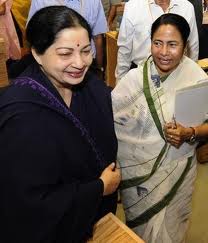 New Delhi, May 6: Though almost all Chief Ministers acknowledged the need for a counter-terror body, on the lines of the proposed National Counter Terrorism Centre, the Centre failed to convince them at Saturday's deliberations here to break the logjam over the final and decisive move towards setting up the hub.
New Delhi, May 6: Though almost all Chief Ministers acknowledged the need for a counter-terror body, on the lines of the proposed National Counter Terrorism Centre, the Centre failed to convince them at Saturday's deliberations here to break the logjam over the final and decisive move towards setting up the hub.
Briefing journalists after the Chief Ministers' meeting, Union Home Minister P. Chidambaram said: “The final decision has not been taken.” While all the Chief Ministers recognised the need for the NCTC or a similar organisation, they voiced two principal concerns: the NCTC's location within the Intelligence Bureau (IB); and why should the NCTC have to undertake operations on its own even in exceptional circumstances?
“There was strong support from many Chief Ministers, qualified support from many and outright rejection of the idea by three Chief Ministers,” Mr. Chidambaram said. The conference was attended by 24 Chief Ministers, Ministers from three States, the Lt. Governor of the Andaman and Nicobar Islands and the administrators of some Union Territories, besides Prime Minister Manmohan Singh.
“We will examine the issues raised by the Chief Ministers carefully, and the government will then take a final decision,” Mr. Chidambaram said, hinting that the NCTC, in its present form, would not come into existence for the time being.
Even the Prime Minister's pitch that the NCTC was not a State-versus-Centre issue failed to cut ice with some of the non-Congress Chief Ministers.
Mr. Chidambaram argued that intelligence gathering and investigation were two key areas, and India needed a counter-terrorism body that would be more than a police organisation, capable of mobilising all elements of national power — be it police, diplomatic or judicial. “This gap can be filled only by a highly qualified and trained counter-terrorism body. We feel the NCTC can fill this gap. And, if not the NCTC, then some other body, and that body has to be given certain powers and functions.”
In the past 15 months, he said, 21 terror modules had been busted, thanks to the cooperation between the Central agencies and the State police forces. “What about cases where we have failed? These were potential terrorist attacks. I firmly believe that we need a counter-terrorism body. I came to the meeting with an open mind, and I am leaving with an open mind to examine every suggestion given by the Chief Ministers.





Comments
Add new comment